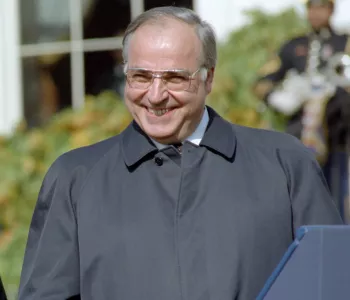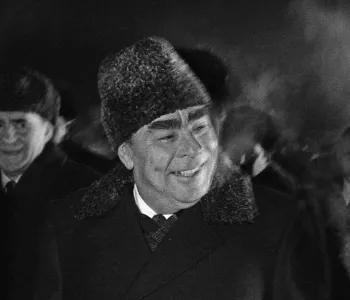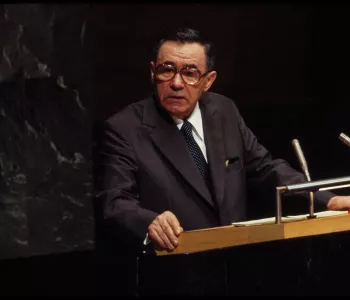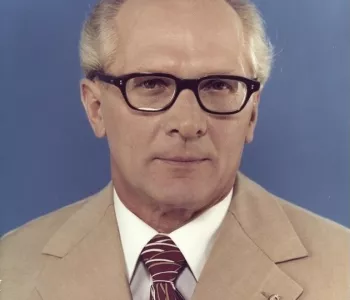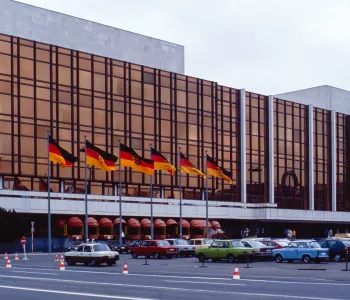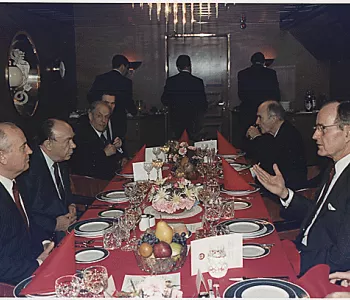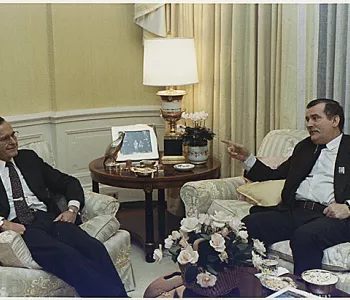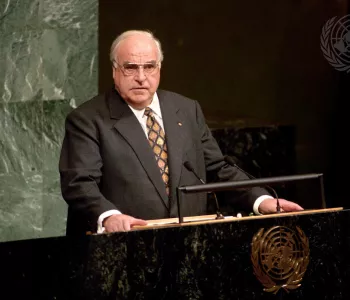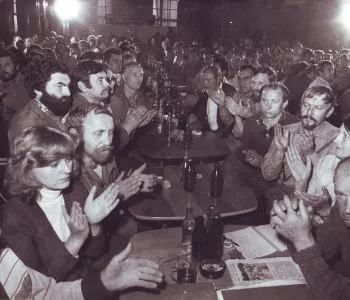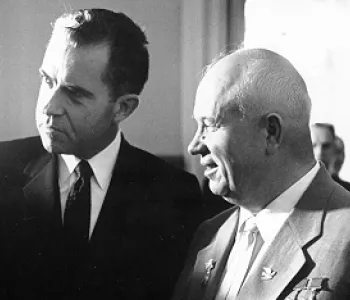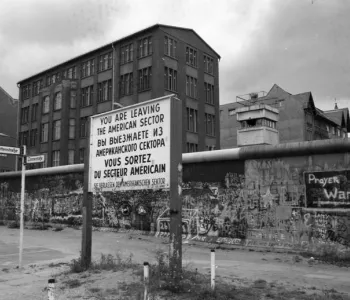d'Vinci

Walesa, Lech 1943-
President of Poland from 1990-1995.

b. September 29, 1943
He founded Solidarity (Solidarność), the Soviet bloc's first independent trade union, won the Nobel Peace Prize in 1983, and served as President of Poland from 1990 to 1995.
He founded Solidarity (Solidarność), the Soviet bloc's first independent trade union, won the Nobel Peace Prize in 1983, and served as President of Poland from 1990 to 1995.
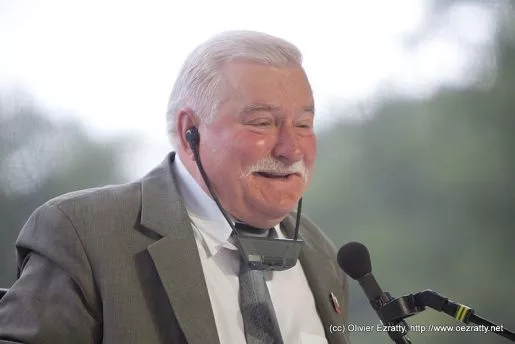
Image, Lech Walesa, 2009, Olivier Ezratty.
Lech Wałęsa entered Lenin Shipyard in Gdańsk as an electrical technician in 1967. In 1968 he married Danuta Wałęsowa, and the couple now have 7 children.
He was a member of the illegal strike committee in Gdańsk Shipyard in 1970. After the bloody end of the strike, resulting in over 80 workers killed by the riot police, Wałęsa was arrested and convicted for "anti social behavior", spending one year in prison.
In 1976 Wałęsa lost his job in Gdańsk Shipyard for collecting signatures for a petition to build a memorial for the killed workers. Due to his being on an informal blacklist, he couldn't find another job and lived at the time thanks to his friends' personal help.
In 1978, together with Andrzej Gwiazda and Aleksander Hall, he organised the illegal underground Free Trade Union of Pommerania (Wolne Związki Zawodowe Wybrzeża). He was arrested several times in 1979 for organizing an "anti-state" organization, but not found guilty in court and released at the beginning of 1980, after which he re-entered the Gdańsk shipyard.
In August 14, 1980, after the beginning of an occupational strike in the Gdańsk Shipyard, Wałęsa illegally scaled the wall of the Shipyard and became the leader of this strike. The strike was spontaneously followed by similar strikes across Poland. Several days later he stopped workers who wanted to leave Gdańsk Shipyard, and persuaded them to organize the Strike Coordination Committee (Międzyzakładowy Komitet Strajkowy) to lead and support the naturally occurred general strike in Poland.
In September of that year, the Communist government signed an agreement with the Strike Coordination Committee to allow legal organization, but not actual free trade unions. The Strike Coordination Committee legalized itself into National Coordination Committee of Solidarność Free Trade Union, and Wałęsa was chosen as a chairman of this Committee.
Wałęsa kept this position until December 1981, when Prime Minister Wojciech Jaruzelski declared a state of martial law. He was interned for 11 months in south-eastern Poland near the Soviet border until November 14, 1982.
In 1983 he applied to come back to Gdańsk Shipyard to his former position as a simple electrician. While formally treated as a "simple worker", he was practically under house arrest until 1987. 1983 also saw Wałęsa being awarded the Nobel Peace Prize. He was unable to receive the prize himself, fearing that the government would not let him back in, so his wife Danuta Wałęsowa received the prize in his place. Wałęsa donated the prize money to the Solidarity movement's temporary headquarters in exile (in Brussels).
From 1987 to 1990 Wałęsa organized and led the "half-illegal" Temporary Executive Committee of Solidarity Trade Union.
In 1988 Wałęsa organized an occupational strike in Gdańsk Shipyard, demanding only the re-legalization of the Solidarity Trade Union. After eighty days the government agreed to enter into round-table talks in September. Wałęsa was an informal leader of the "non-governmental" side during the talks. During the talks the government signed an agreement to re-establish the Solidarity Trade Union and to organize "half-free" elections to Polish parliament.
In 1989 Wałęsa organized and led the Citizenship Committee of the Chairman of Solidarity Trade Union. Formally it was just an advisory body, but practically it was a kind of a political party, which won parliament elections in 1989 (Opposition took 48% of seats in the Sejm out of 49% that were subject of free elections and all but one seats in the newly re-established senate; the remaining 51% of seats were given automatically to Communist Party according to the Round Table agreements).
While technically just a Chairman of Solidarity Trade Union at the time Wałęsa played a key role in Polish politics. At the end of 1989 he persuaded leaders from formally communist ally parties to form a non-communist coalition government, which was the first non-communist government in the Soviet Bloc. After that agreement, to the big surprise of the Communist Party, the parliament chose Tadeusz Mazowiecki for prime minister of Poland. Poland, while still a communist country in theory, started to change its economy to the free market system.
In 1990 Wałęsa won the presidential election, becoming president of Poland for next 5 years. During his presidency he started so called "war at the top" which practically meant changing the government annually. His style of presidency was however strongly criticized by most of the political parties, and he lost most of the initial public support by the end of 1995. However, during his presidency Poland was completely changed, from an oppressive communist country under strict soviet control and with a weak economy to an independent and democratic country with a fast growing free-market economy.
Wałęsa lost the 1995 presidential election. After that he claimed to go to "political retirement", but he was still active, trying to establish his own political party. In 1997 Wałęsa supported and helped to organize a new party called "Election Action Solidarity" (Akcja Wyborcza Solidarność) which won the parliamentary elections. However, his support was of minor significance and Wałęsa held a very low position in this party. The real leader of the party and its main organizer was a new Solidarity Trade Union leader, Marian Krzaklewski.
Wałęsa again stood for the presidential election in 2000, but he received less than 1% of votes. After that Wałęsa again claimed his political retirement. From that time on he has been lecturing on the history and politics of Central Europe at various foreign universities.
In May 10, 2004, the Gdańsk-Tricity international airport has been officially renamed to Gdańsk Lech Wałęsa Airport to commemorate the famous Gdańsk citizen.
Lech Wałęsa entered Lenin Shipyard in Gdańsk as an electrical technician in 1967. In 1968 he married Danuta Wałęsowa, and the couple now have 7 children.
He was a member of the illegal strike committee in Gdańsk Shipyard in 1970. After the bloody end of the strike, resulting in over 80 workers killed by the riot police, Wałęsa was arrested and convicted for "anti social behavior", spending one year in prison.
In 1976 Wałęsa lost his job in Gdańsk Shipyard for collecting signatures for a petition to build a memorial for the killed workers. Due to his being on an informal blacklist, he couldn't find another job and lived at the time thanks to his friends' personal help.
In 1978, together with Andrzej Gwiazda and Aleksander Hall, he organised the illegal underground Free Trade Union of Pommerania (Wolne Związki Zawodowe Wybrzeża). He was arrested several times in 1979 for organizing an "anti-state" organization, but not found guilty in court and released at the beginning of 1980, after which he re-entered the Gdańsk shipyard.
In August 14, 1980, after the beginning of an occupational strike in the Gdańsk Shipyard, Wałęsa illegally scaled the wall of the Shipyard and became the leader of this strike. The strike was spontaneously followed by similar strikes across Poland. Several days later he stopped workers who wanted to leave Gdańsk Shipyard, and persuaded them to organize the Strike Coordination Committee (Międzyzakładowy Komitet Strajkowy) to lead and support the naturally occurred general strike in Poland.
In September of that year, the Communist government signed an agreement with the Strike Coordination Committee to allow legal organization, but not actual free trade unions. The Strike Coordination Committee legalized itself into National Coordination Committee of Solidarność Free Trade Union, and Wałęsa was chosen as a chairman of this Committee.
Wałęsa kept this position until December 1981, when Prime Minister Wojciech Jaruzelski declared a state of martial law. He was interned for 11 months in south-eastern Poland near the Soviet border until November 14, 1982.
In 1983 he applied to come back to Gdańsk Shipyard to his former position as a simple electrician. While formally treated as a "simple worker", he was practically under house arrest until 1987. 1983 also saw Wałęsa being awarded the Nobel Peace Prize. He was unable to receive the prize himself, fearing that the government would not let him back in, so his wife Danuta Wałęsowa received the prize in his place. Wałęsa donated the prize money to the Solidarity movement's temporary headquarters in exile (in Brussels).
From 1987 to 1990 Wałęsa organized and led the "half-illegal" Temporary Executive Committee of Solidarity Trade Union.
In 1988 Wałęsa organized an occupational strike in Gdańsk Shipyard, demanding only the re-legalization of the Solidarity Trade Union. After eighty days the government agreed to enter into round-table talks in September. Wałęsa was an informal leader of the "non-governmental" side during the talks. During the talks the government signed an agreement to re-establish the Solidarity Trade Union and to organize "half-free" elections to Polish parliament.
In 1989 Wałęsa organized and led the Citizenship Committee of the Chairman of Solidarity Trade Union. Formally it was just an advisory body, but practically it was a kind of a political party, which won parliament elections in 1989 (Opposition took 48% of seats in the Sejm out of 49% that were subject of free elections and all but one seats in the newly re-established senate; the remaining 51% of seats were given automatically to Communist Party according to the Round Table agreements).
While technically just a Chairman of Solidarity Trade Union at the time Wałęsa played a key role in Polish politics. At the end of 1989 he persuaded leaders from formally communist ally parties to form a non-communist coalition government, which was the first non-communist government in the Soviet Bloc. After that agreement, to the big surprise of the Communist Party, the parliament chose Tadeusz Mazowiecki for prime minister of Poland. Poland, while still a communist country in theory, started to change its economy to the free market system.
In 1990 Wałęsa won the presidential election, becoming president of Poland for next 5 years. During his presidency he started so called "war at the top" which practically meant changing the government annually. His style of presidency was however strongly criticized by most of the political parties, and he lost most of the initial public support by the end of 1995. However, during his presidency Poland was completely changed, from an oppressive communist country under strict soviet control and with a weak economy to an independent and democratic country with a fast growing free-market economy.
Wałęsa lost the 1995 presidential election. After that he claimed to go to "political retirement", but he was still active, trying to establish his own political party. In 1997 Wałęsa supported and helped to organize a new party called "Election Action Solidarity" (Akcja Wyborcza Solidarność) which won the parliamentary elections. However, his support was of minor significance and Wałęsa held a very low position in this party. The real leader of the party and its main organizer was a new Solidarity Trade Union leader, Marian Krzaklewski.
Wałęsa again stood for the presidential election in 2000, but he received less than 1% of votes. After that Wałęsa again claimed his political retirement. From that time on he has been lecturing on the history and politics of Central Europe at various foreign universities.
In May 10, 2004, the Gdańsk-Tricity international airport has been officially renamed to Gdańsk Lech Wałęsa Airport to commemorate the famous Gdańsk citizen.
